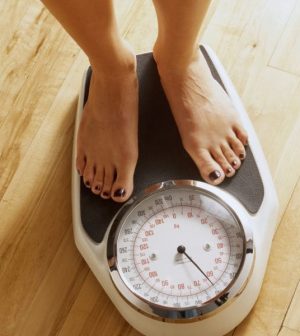- Could Your Grocery Store Meat Be Causing Recurring UTIs?
- Are You Making This Expensive Thermostat Error This Winter?
- Recognizing the Signs of Hypothyroidism
- 10 Strategies to Overcome Insomnia
- Could Artificial Sweeteners Be Aging the Brain Faster?
- Techniques for Soothing Your Nervous System
- Does the Water in Your House Smell Funny? Here’s Why
- Can a Daily Dose of Apple Cider Vinegar Actually Aid Weight Loss?
- 6 Health Beverages That Can Actually Spike Your Blood Sugar
- Treatment Options for Social Anxiety Disorder
Diabetes Can Make Weight-Loss Harder. Here’s Help

Because of the medications they take, losing weight can be difficult for people with diabetes.
Diabetes medications are a major roadblock to weight loss, according to a paper from the American Association of Diabetes Educators.
“Diabetes medications are vital in helping manage blood sugar, so you shouldn’t stop taking them. Instead, ask (your doctor) about alternative medications and treatment strategies,” co-author Patricia Davidson said in an association news release. She’s an assistant professor at
West Chester University in Pennsylvania.
There are other things that could be holding you back, too. “Everyone needs an individualized strategy for managing diabetes and losing weight. A diabetes educator can help,” said co-author Katherine O’Neal, of the University of Oklahoma College of Pharmacy.
The paper outlines ways for people to manage their diabetes and lose weight. The tips might also help others avoid or delay getting type 2 diabetes, especially those with prediabetes.
Get at least 150 minutes a week (about 22 minutes a day) of physical activity. The more the better, so try to work toward 300 minutes of activity a week (about 43 minutes a day).
This might be easier to achieve if you do things you enjoy, such as dancing at home or at a club, walking the dog, or going for a stroll after dinner. Work activity into your daily routines, such as walking around the grocery store before loading up your cart, parking in the farthest spot when running errands, or sprinting up and down the stairs when doing laundry.
Watch your diet. High-fiber foods can lower your blood sugar, help you lose weight, and decrease the amount of medication you need. Try to get 25 to 30 grams of fiber a day.
At least 10 grams of your daily fiber intake should come from fruits and vegetables. Aim for five servings a day: ideally, one or two fruits and three or four veggies. Whole grains are another important source of fiber.
A food and/or activity tracking mobile app can help keep you motivated. It’s also a good idea to seek online and in-person support groups of people in the same situation.
Weight-loss surgery may be an option, but is typically limited to people who are very obese. It also carries significant risks.
More information
The American Diabetes Association has more on weight loss.
Source: HealthDay
Copyright © 2026 HealthDay. All rights reserved.










